Index relies entirely on the support of donors and readers to do its work.
Help us keep amplifying censored voices today.
[vc_row][vc_column][vc_custom_heading text=”With contributions from Xinran, Ahmet Altan, Stephen Woodman, Karoline Kan, Conor Foley, Robert Harris, Stefano Pozzebon and Melanio Escobar”][/vc_column][/vc_row][vc_row][vc_column][vc_column_text]
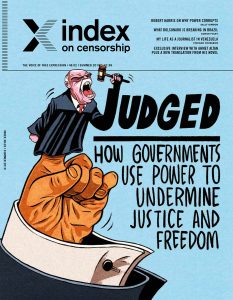
Judged: How governments use power to undermine justice and freedom. The summer 2019 edition of Index on Censorship magazine
[/vc_column_text][/vc_column][/vc_row][vc_row][vc_column][vc_custom_heading text=”Special Report: Judged: How governments use power to undermine justice and freedom”][/vc_column][/vc_row][vc_row][vc_column][vc_column_text]Law and the new world order by Rachael Jolley on why the independence of the justice system is in play globally, and why it must be protected
Turkey’s rule of one by Kaya Genc President Erdogan’s government is challenging the result of Istanbul’s mayoral elections. This could test further whether separation of powers exists
England, my England (and the Romans) by Sally Gimson Best-selling novelist Robert Harris on how democracy and freedom of expression are about a lot more than one person, one vote
“It’s not me, it’s the people” by Stephen Woodman Mexico’s new government promised to start rebuilding the pillars of democracy, but old habits die hard. Has anything changed?
When political debate becomes nasty, brutish and short by Jan Fox President Donald Trump has been trampling over democratic norms in the USA. How are US institutions holding up?
The party is the law by Karoline Kan In China, hundreds of human rights lawyers have been detained over the past years, leaving government critics exposed
Balls in the air by Conor Foley The macho politics of Brazil’s new president plus ex-president Dilma Rousseff’s thoughts on constitutional problems
Power and Glory by Silvia Nortes The Catholic church still wields enormous power in Spain despite the population becoming more secular
Stripsearch by Martin Rowson In Freedonia
What next for Viktor Orbán’s Hungary? Viktoria Serdult looks at what happens now that Hungary’s prime minister is pressurising the judiciary, press, parliament and electoral system
When justice goes rogue by Melanio Escobar and Stefano Pozzebon Venezuela is the worst country in the world for abuse of judicial power. With the economy in freefall, journalists struggle to bear witness
“If you can keep your head, when all about you are losing theirs…” by Caroline Muscat It’s lonely and dangerous running an independent news website in Malta, but some lawyers are still willing to stand up to help
Failing to face up to the past by Ryan McChrystal argues that belief in Northern Ireland’s institutions is low, in part because details of its history are still secret
[/vc_column_text][/vc_column][/vc_row][vc_row][vc_column][vc_custom_heading text=”Global View”][vc_column_text]Small victories do count by Jodie Ginsberg The kind of individual support Index gives people living under oppressive regimes is a vital step towards wider change[/vc_column_text][/vc_column][/vc_row][vc_row][vc_column][vc_custom_heading text=”In Focus”][vc_column_text]Sending out a message in a bottle by Rachael Jolley Actor Neil Pearson, who shot to international fame as the sexist boss in the Bridget Jones’ films, talks about book banning and how the fight against theatre censorship still goes on
Remnants of war by Zehra Dogan Photographs from the 2019 Freedom of Expression Arts Award fellow Zehra Doğan’s installation at Tate Modern in London
Six ways to remember Weimar by Regula Venske The name of this small town has mythic resonances for Germans. It was the home of many of the country’s greatest classical writers and gave its name to the Weimar Republic, which was founded 100 years ago
“Media attacks are highest since 1989” by Natasha Joseph Politicians in South Africa were issuing threats to journalists in the run-up to the recent elections. Now editors have built a tracking tool to fight back
Big Brother’s regional ripple effect by Kirsten Han Singapore’s recent “fake news” law which gives ministers the right to ban content they do not like, may encourage other regimes in south-east Asia to follow suit
Who guards the writers? Irene Caselli reports on journalists who write about the Mafia and extremist movements in Italy need round-the-clock protection. They are worried Italy’s deputy prime minister Matteo Salvini will take their protection away
China in their hands by Xinran The social credit system in China risks creating an all-controlling society where young people will, like generations before them, live in fear
Playing out injustice by Lewis Jennings Ugandan songwriter and politician Bobi Wine talks about how his lyrics have inspired young people to stand up against injustice and how the government has tried to silence him[/vc_column_text][/vc_column][/vc_row][vc_row][vc_column][vc_custom_heading text=”Culture”][vc_column_text]“Watch out we’re going to disappear you” by Claudia Pineiro The horrors of DIY abortion in a country where it is still not legal are laid bare in this story from Argentina, translated into English for the first time
“Knowing that they are there, helps me keep smiling in my cell” by Ahmet Altan The best-selling Turkish author and journalist gives us a poignant interview from prison and we publish an extract from his 2005 novel The Longest Night
A rebel writer by Eman Abdelrahim An exclusive extract from a short story by a new Egyptian writer. The story deals with difficult themes of mental illness set against the violence taking place during the uprising in Cairo’s Tahrir Square[/vc_column_text][/vc_column][/vc_row][vc_row][vc_column][vc_custom_heading text=”Column”][vc_column_text]Index around the world – Speak out, shut out by Lewis Jennings Index welcomed four new fellows to our 2019 programme. We were also out and about advocating for free expression around the world[/vc_column_text][/vc_column][/vc_row][vc_row][vc_column][vc_custom_heading text=”Endnote”][vc_column_text]
End note – Hanging truth out to dry by Sally Gimson Documentary maker Maxim Pozdorovkin explains why propaganda these days is all about disorientation and creating a situation where it is hard to figure out what is true
[/vc_column_text][/vc_column][/vc_row][vc_row][vc_column width=”1/3″][vc_custom_heading text=”Subscribe”][vc_column_text]In print, online, in your mailbox, on your iPad.
Subscription options from £18 or just £1.49 in the App Store for a digital issue.
Every subscriber helps support Index on Censorship’s projects around the world.
![]() SUBSCRIBE NOW[/vc_column_text][/vc_column][vc_column width=”1/3″][vc_custom_heading text=”Listen”][vc_column_text]Music has long been a form of popular rebellion, especially in the 21st century. These songs, provide a theme tune to the new magazine and give insight into everything from the nationalism in Viktor Orban’s Hungary to the role of government-controlled social media in China to poverty in Venezuela
SUBSCRIBE NOW[/vc_column_text][/vc_column][vc_column width=”1/3″][vc_custom_heading text=”Listen”][vc_column_text]Music has long been a form of popular rebellion, especially in the 21st century. These songs, provide a theme tune to the new magazine and give insight into everything from the nationalism in Viktor Orban’s Hungary to the role of government-controlled social media in China to poverty in Venezuela
LISTEN HERE[/vc_column_text][/vc_column][vc_column width=”1/3″][vc_custom_heading text=”Listen”][vc_column_text]The summer 2019 magazine podcast, featuring interviews with best-selling author Xinran; Italian journalist and contributor to the latest issue, Stefano Pozzebon; and Steve Levitsky, the author of the New York Times best-seller How Democracies Die.
LISTEN HERE[/vc_column_text][/vc_column][/vc_row]
FEATURING
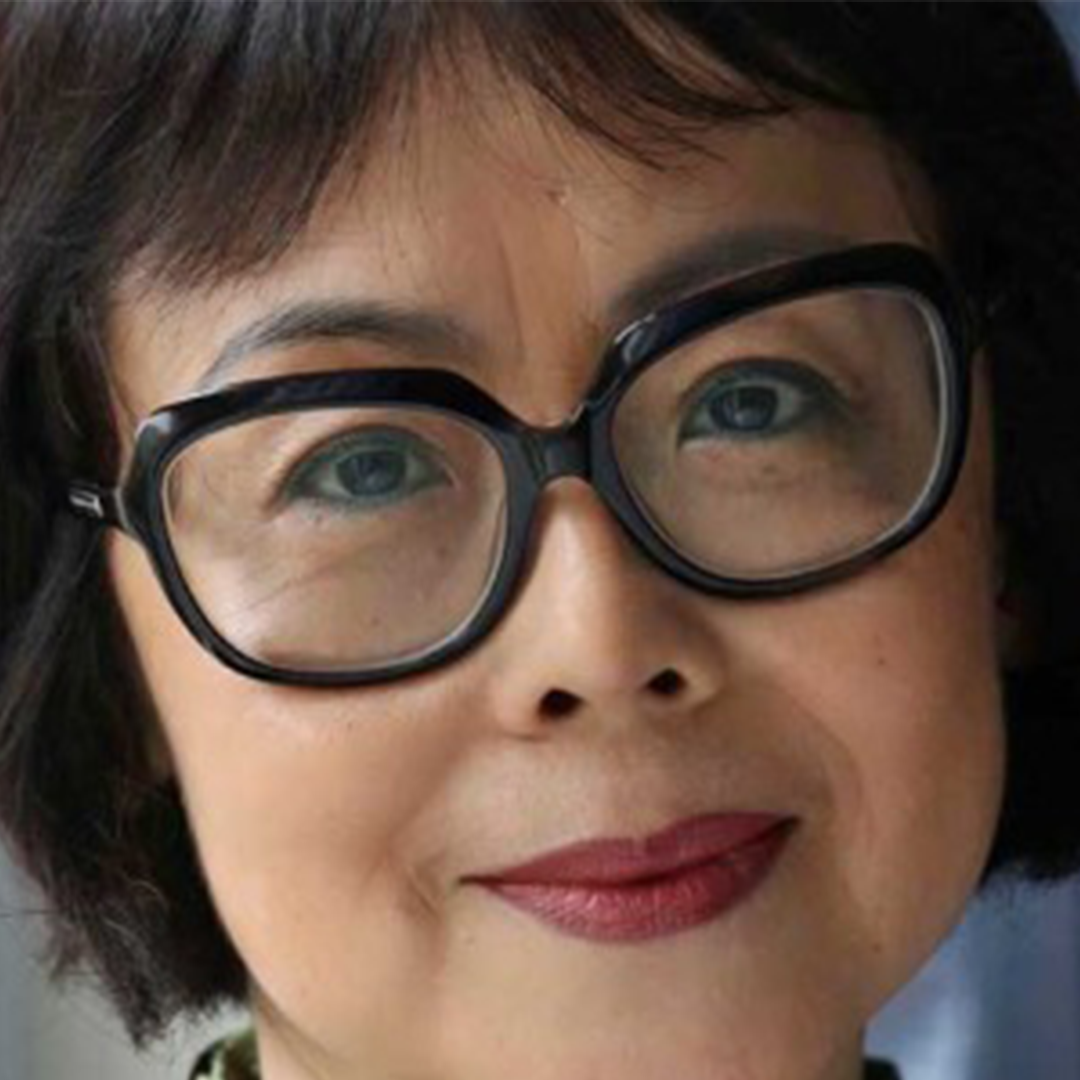
Writer
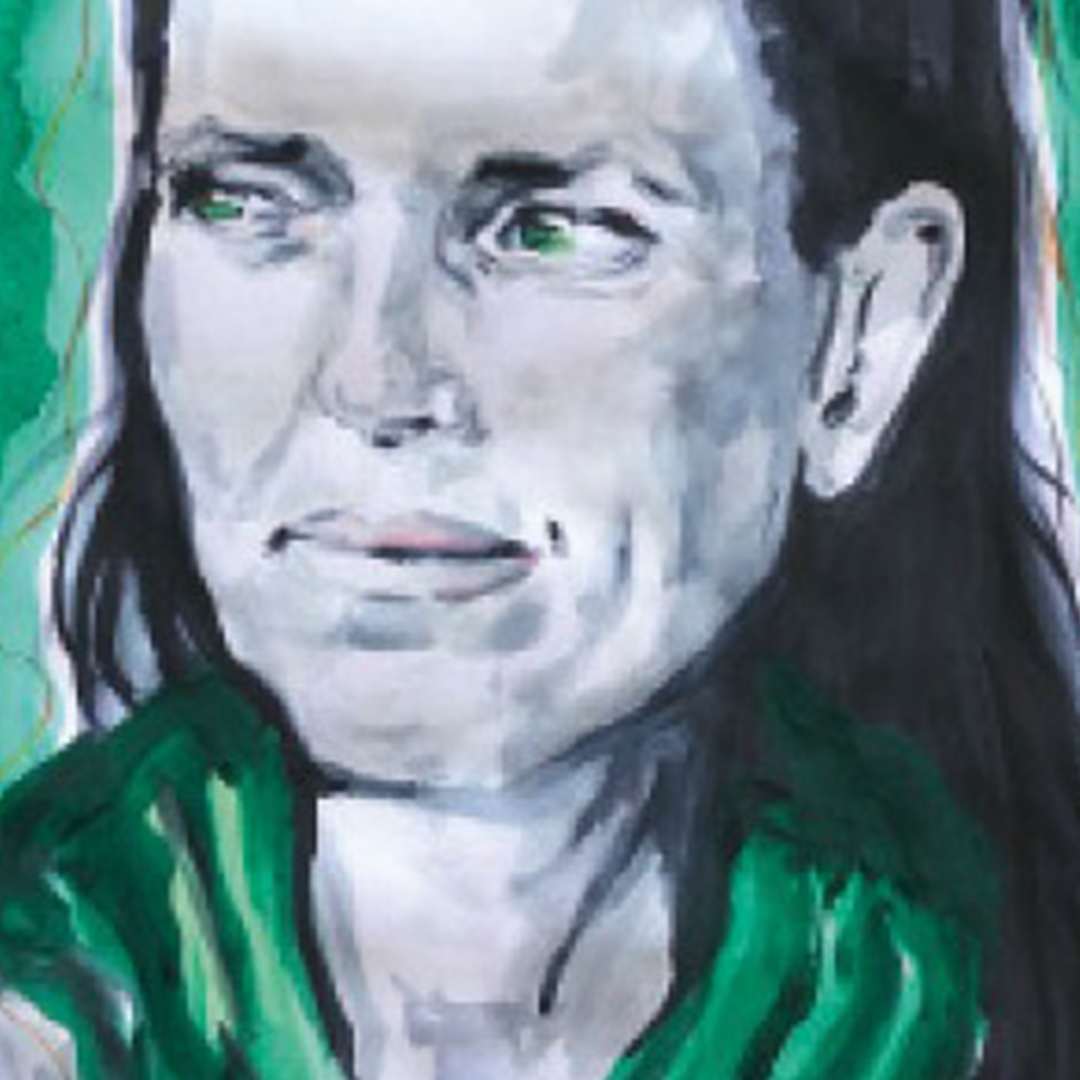
Novelist
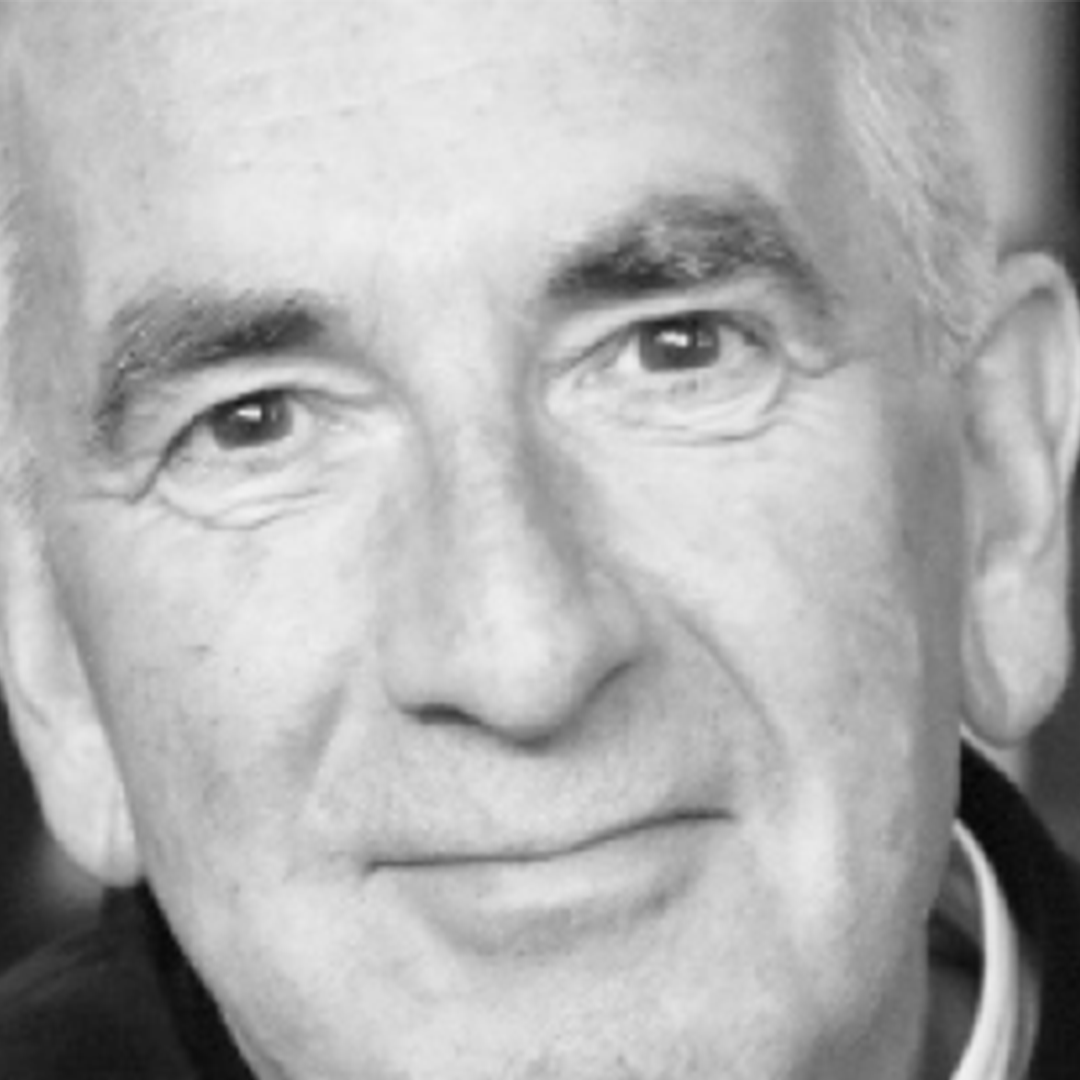
Author
[vc_row][vc_column][vc_column_text]This article is part of an ongoing series created in partnership with Scholars at Risk, an international network of institutions and individuals whose mission it is to protect scholars, promote academic freedom, and defend everyone’s right to think, question, and share ideas freely and safely.[/vc_column_text][vc_single_image image=”107359″ img_size=”full” add_caption=”yes”][vc_column_text]
“I realised that I had been cheated by the Chinese government,” legal scholar Teng Biao said describing his drive to pursue a career in human rights law.
Teng said that he was motivated by the Tiananmen Square movement, the student-led protests that bloomed after the death of pro-reform communist leader Hu Yaobang in April 1989. An officially-sanctioned mourning period provided an opening for Chinese to express their anxieties about the direction of the country. Officials reacted with a mixture of conciliatory and hardline tactics that revealed a split with the communist party leadership. Ultimately, the hardliners won out, with the country’s paramount leader at the time, Deng Xiaoping, and his allies resolving to use force to suppress the movement. Up to 300,000 troops mobilised under a martial law order implemented on 20 May. On 4 June 1989, the troops were ordered into central Beijing, killing both demonstrators and bystanders in the process. Estimates of the death toll vary from several hundred to thousands.
“So many people have sacrificed their lives to fight for democracy and freedom, so I cannot be silent, and I cannot give up,” Teng said.
For his efforts to defend human rights in China by taking on politically sensitive cases, Teng, who has been abducted three times, moved to the USA in 2014. He continues to pursue human rights law and activism as a visiting scholar at Princeton, Harvard, and New York University.
As the Chinese regime continues its crackdown on scholars, intellectuals, journalists and human rights lawyers, Teng analyzes the way in which the Chinese regime under Xi Jinping has used high-technology totalitarianism to successfully target and suppress dissidents.
Although Teng now lives in the United States, he still feels the weight of censorship and pressure from the Chinese regime. In 2016, the American Bar Association abruptly cancelled the publication of his book, “Darkness Before Dawn”, which details his 11-year career as a rights defender in China.
Despite his setbacks, Teng has co-founded Beijing’s China Against the Death Penalty, and the Open Constitution Initiative, an organisation of lawyers and academics that advocates for the rule of law in China. He also co-founded the China Human Rights Accountability Center from the United States.
Summer Dosch interviewed Teng for Index on Censorship.
Index: What motivated you to specialise in human rights law?
Teng Biao: Before I went to the university, I was a brainwashed high school student, and I didn’t know the meaning of law, human rights, or politics. After a few years of studying in law school at Peking University, I realised that I had been cheated by the Chinese government. I gradually had to develop independent thinking. Once I knew more about the human rights situation in China, I decided to become a scholar. Before I got my PhD, my idea was to focus on academic and intellectual work so that I could use it to promote human rights law in China. Soon after I began to teach at a university in Beijing, I participated in a very influential case, and then I founded a human rights entity. After that, I became a human rights lawyer and dedicated my work to the human rights cause in China.
Index: When did you start receiving threats from the Chinese regime for your work?
Teng: When I started my human rights work, my first case was quite influential, so I was prepared to receive harassment from the government; however I didn’t. Shortly after continuing my human rights work, I received harassment and warnings from the university and the government.
Index: What motivated you to keep teaching, and pursuing human rights law despite the limitations you faced and the threats you received from the Chinese regime?
Teng: I feel as though I have a special responsibility to promote human rights in China as a lawyer and an intellectual. In the early 2000’s, I felt that China was in the process of democratisation, and that there was still so much human rights work to do. It is dangerous, but I thought that I needed to take more risks as an intellectual. Two years after the Tiananmen massacre, I went to the university and I started learning the truth behind it, and I saw myself as survivor of the massacre. So many people have sacrificed their lives to fight for democracy and freedom, so I cannot be silent, and I cannot give up. The feeling of being a survivor of the Tiananmen massacre motivated me to keep going.
Index: What do you think of the current situation in China today?
Teng: After the Tiananmen massacre in 1989, the Chinese Communist Party instituted some economic reforms. In terms of the political system, the reform never happened; therefore it remains a one party system. The fundamental freedoms and human rights of the Chinese people remain very limited. In terms of human rights and press freedom, China has always been one of the worst countries in the world. Before Xi Jinping came to power in late 2012, the crackdown on Chinese society was severe. Although censorship and persecution were there, they were not like what Jinping has been doing for the past six years. After 2013, the human rights situation deteriorated even more. Jinping has turned China’s collective dictatorship into a personal dictatorship.
The Communist party is also establishing what I call high-technology totalitarianism. This kind of high-tech totalitarianism has never happened in human history. It includes DNA collection, facial recognition, artificial intelligence, big data, and a sociocratic system, which have all been used by the Chinese government to strengthen its control over society. Jinping and the Chinese government started a comprehensive crackdown that targeted all the forces that had been fighting for freedom and human rights law, including human rights lawyers, bloggers, scholars, underground churches, and the internet. This crackdown is getting worse, and will continue to get worse in the years to come.
Index: What do you think of Chinese-American relations today? How do they continue to threaten international freedom and intellectual freedom?
Teng: I am quite critical of the American policy towards China. American and other western democracies have adopted an engagement policy. They think that if they permit China to be a part of WTO and international human rights treaties, China will start to move towards democracy, and promote more of an open society; however this has not happened. Human rights activists and dissidents have always called for policy change, and for a link between human rights and business; however the United States has not listened until just recently. Within the last two to three years, I sense that the United States is thinking about a policy change. They have seen more and more evidence that China has become a threat to international free order. Then we also see the trade war between the United States and China, which indicates that there will be more tension between the two countries. The Chinese government has violated human rights and freedom in China, and in doing so has become a threat to global human rights and freedom. So I believe that the threat is from the Chinese government, not from China-United States relations.
Index: How do current Chinese-American relations affect your work as a human rights lawyer today?
Teng: Before 2014, I was in Taicheng publishing my articles and books, and I was also traveling internationally. Because of my human rights activities, I was put under house arrest, kidnapped by the secret police, and tortured. During this time, I wasn’t able to continue my human rights work. Even in the United States, I still feel pressure and interference from the Chinese government. A publishing unit refused to publish my book after I had signed the agreement because they were afraid of the Chinese government. They told me that my book would endanger their programs in China. My graduate talk was also canceled by an ivy league university in the United States.
After I came to the United States, my wife and my children were prevented from leaving China, and were held by the Chinese government as hostages. I also received death threats from anonymous Twitter users, who were obviously working for a Chinese agent. There are many more examples similar to these. Again the threat to my work comes from the Chinese government, not from China-United States relations.
Index: How have intellectuals in China responded to the decline of intellectual freedom in China?
Teng: Most intellectuals, writers, scholars, and journalists are controlled by the Chinese government. No matter what kind of belief or ideology they have, they don’t criticise the Chinese government publically. Only a few intellectuals are brave enough to share their independent thoughts that criticise the current government system. Some of these intellectuals would be seen as dissidents if they went any further. For the past five to six years, intellectual and academic freedom has been decreasing very rapidly. The information control of districts, universities, and publishers became severe. More intellectuals are afraid of being outspoken, so they stay silent, delete their social media, and don’t write critical articles. Only a few dozen intellectuals are still active and courageous enough to be critical.
Index: Do you think there has been a significant emigration of scholars and intellectuals from China?
Teng: I have seen some intellectuals go to the United States in exile, and there will be more. The problem is that it is not easy to live in the United States in exile. Some scholars and human rights activists are in great danger if they continue to live in China. Some of them have been fired, imprisoned, or tortured and therefore have to leave China to apply for political asylum. Most scholars who feel unhappy and pressure from the government, but are not facing immediate danger do not think that it is easy to live in a foreign country. So we haven’t seen hundreds and thousands of Chinese scholars and intellectuals moving outside of the country.
Index: Why did you decide to flee to the United States and what has life been like for you and your family since moving there?
Teng: When I was in China, I was detained and tortured a few times, and my family was targeted. Even after my abduction, disappearance, and torture, I continued my work. In late 2013, many activists of the New Citizens Movement were arrested, and I am one of the initiators of the New Citizens Movement. At that time I was also a visiting scholar at a Chinese university in Hong Kong, so it was quite clear that if I went back to China from Hong Kong, I would be arrested and no longer able to continue my work. I then accepted an invitation from Harvard Law School.
Index: How has your family adapted to life in the United States?
Teng: They are accustomed to American life, but it is always a challenge for foreigners to live in a new country. The language barrier, and the culture difference make life especially difficult. Because of the pressure from the Chinese government, my wife was fired from the company that she had been working for for 17 years. It is not easy for me to get a job because my degree is from China, so I have had to start from zero in the United States; however at least my wife and children are not living in fear. I appreciate the free and safe environment in the United States where I can continue to pursue my human rights activism.
Index: What were you teaching or working on when you were abducted by the secret police?
Teng: The first time I was abducted was in 2008, and the second time was in 2011. I was a lecturer at the China University of Political Science and Law. I was teaching jury’s prudence and constitutional law, but the main reason I was abducted was because of my involvement in several human rights cases, which related to Tibetans, underground churches, and unlawful convictions. I have been involved in many politically sensitive cases. The third time I was abducted was in 2012, and I was only held hostage for one night. I was released before my friends, family, and the media knew about my abduction.
Index: Do you have plans to go back to China in the near future?
Teng: As a human rights lawyer, I really want to work in China. I enjoyed the time I was fighting for human rights law and democracy with my Chinese colleagues. But now, I am unable to return to China without being blocked or arrested by the Chinese government. I predict that government control will only tighten in the coming years, and because of this I will not be able to go back to China. But I really hope that I can go back to either a free China, or as a human rights lawyer to continue my human rights work without being imprisoned for the long-term.
Index: What are your thoughts about the protests against the extradition law being proposed in Hong Kong?
Teng: On June 10 2014, by issuing a ‘white paper’, Beijing had destroyed ‘one country two systems’ which is not only a promise to Hong Kong and UK, but also a part of international commitment. Hong Kong has been an impressive example that a dictatorial regime will not tolerate a special region which has political freedom. The Umbrella Movement was a failed fight for universal suffrage, but the protest against the extradition law seems to be the ‘last fight’, because if this extradition bill is passed, a free Hong Kong will be over soon. It is the shame of the WHOLE WORLD to helplessly see how a free and prosperous city was occupied and killed by a dictatorial regime, and by the appeasement policy adopted by the democracies.
[/vc_column_text][/vc_column][/vc_row][vc_row full_width=”stretch_row_content”][vc_column][three_column_post title=”Scholars at Risk” full_width_heading=”true” category_id=”31940″][/vc_column][/vc_row]
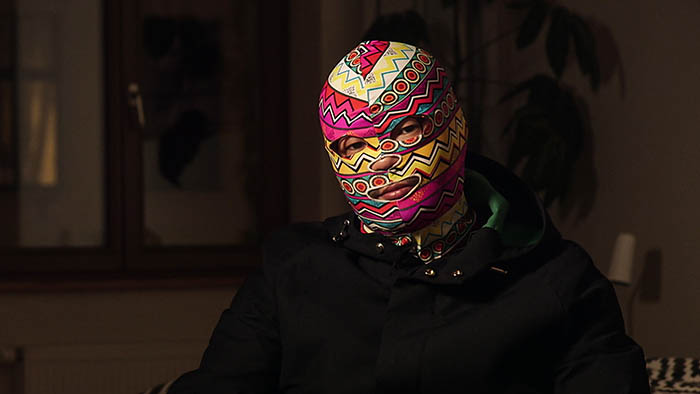
Badiucao, one of China’s leading dissident cartoonists, has revealed his identity after years of anonymity. In November 2018 following his campaign that saw thousands of people around the world recreate the image of Tank Man, an unidentified Chinese man who stood in front of a column of tanks in Tiananmen Square in June 1989, Badiucao was forced to close his debut solo exhibition in Hong Kong after Chinese authorities threatened his family.
Jodie Ginsberg, CEO of Index on Censorship, said “Badiucao’s courage and commitment is an inspiration to cartoonists and campaigners all over the world. The risks inherent in revealing his identity is a stark reminder of how censorship and suppression of dissent continue in China — even though it is 30 years since the Tiananmen Square massacre. Many governments fear the power of cartoonists, but cartoonists should be celebrated as invaluable contributors to democracy.”
“Badiucao has displayed exemplary courage in the face of palpable threats from the Chinese state,” Terry Anderson, deputy executive director of Cartoonists Rights Network International said. “Over the past decade his artwork has served to remind the wider world and in particular the Chinese diaspora as well as the increasing numbers of international students and tourists from the county of unpalatable truths the CCP seeks to suppress. Like so many dissidents Badiucao is forced into exile, its own form of violence against a person. On the 30th anniversary of the horror at Tiananmen Square it is incumbent on each of us to reflect upon what has changed since and more importantly what has not. Badiucao, the other free-speech advocates featured in Danny Ben-Moshe’s truly remarkable film and all those seeking reform in China deserve our support.”
CRNI is the winner of the Index Freedom of Expression Award 2019 in the campaigning category.
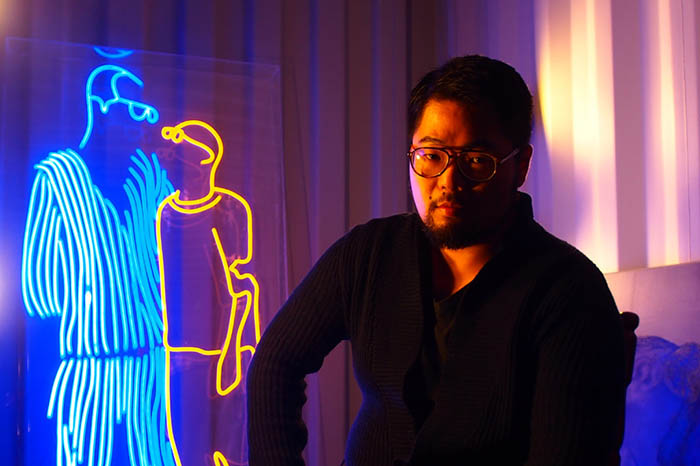
OLYMPUS DIGITAL CAMERA